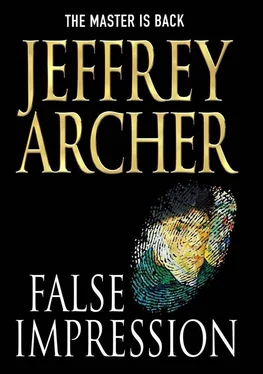His platoon had been surrounded on the border with Bulgaria. They were quickly rounded up and marched to the nearest prisoner-of-war camp. He could still hear the cries of his young volunteers, some of whom had only just left school. And then, once they had told her everything they knew, or nothing at all, she would slit their throats while staring into their eyes. Once she was certain they were dead, with one more sweeping movement of her knife she would hack off the head, then dump it in the middle of an overcrowded cell. Even the most hardened of her henchmen had to avert their eyes.
Before leaving, she would spend a little time looking around at those who had survived. Each night she left with the same parting words, “I still haven’t decided which one of you will be next.”
Three of his men had survived, and only because a new set of prisoners, with more up-to-date information, had recently been captured. But for thirty-seven sleepless nights, Colonel Sergei Slatinaru could only wonder when it would be his turn. Her last victim had been Anna’s father, one of the bravest men he’d ever known, who, if he had to die, deserved to go to his grave fighting the enemy — not at the hands of a butcher.
When they were finally repatriated, one of his first duties as commanding officer was to tell Anna’s mother how Captain Petrescu had been killed. He lied, assuring her that her husband died bravely on the battlefield. Why should he pass his nightmare on to her? And then Anton phoned to say he’d had a call from Captain Petrescu’s daughter; she was coming to Bucharest, and would he... someone else he didn’t pass his secret on to.
Once the hostilities had ceased, rumor concerning Krantz was rife. She was in jail, she had escaped to America, she’d been killed. He prayed that she was still alive, as he wanted to be the one to kill her. But he feared that she would never show her face in Romania again, because so many former comrades would recognize her and line up for the privilege of cutting her throat. But why had she returned? What could possibly be in that crate to make her take such a risk?
Sergei slowed down when he reached a barren stretch of land, where the runway had once been but was now covered in weeds and potholes. He kept one hand on the wheel, while the other moved slowly down his left side and reached underneath the seat for a gun he hadn’t used since Ceauşescu had been executed.
“Where do you want me to drop you, madam?” he asked, as if they were in the middle of a busy street. He placed his fingers around the handle of the gun. She didn’t reply. His eyes glanced up into the rearview mirror, realizing that any sudden movement would alert her. Not only did she have the advantage of being behind him, but she was now watching his every move. He knew one of them would be dead in the next sixty seconds.
Sergei placed his index finger round the trigger, eased the gun from under his seat and began to raise his arm slowly, inch by inch. He was about to hit the brakes when a hand grabbed his hair and jerked back his head in one sharp movement. His foot came off the accelerator and the car slowed to a halt in the middle of the runway. He raised the gun another inch.
“Where is the girl going?” she demanded, pulling his head even farther back so that she could look into his eyes.
“What girl?” he managed to say as he felt the knife touch his skin just below the Adam’s apple.
“Don’t play games with me, old man. The girl you dropped at the airport.”
“She didn’t say.” Another inch.
“She didn’t say, even though you drove her everywhere? Where?” she shouted, the edge of the blade now piercing the skin.
One more inch.
“I’ll give you one last chance,” she screamed as the blade broke the skin and warm blood began to trickle down his neck. “Where — was — she — going?” Krantz demanded.
“I don’t know,” Sergei screamed, as he raised the gun, pointed it toward her head, and pulled the trigger.
The bullet ripped into Krantz’s shoulder and threw her backward, but she never let go of his hair. Sergei pulled the trigger again, but there was a full second between the two shots. Just long enough for her to slit his throat in a single movement.
Sergei’s last memory before he died was staring into those cold, gray eyes.
Leapman wasn’t asleep when his phone rang. But then he rarely slept, although he knew there was only one person who would consider calling him at such an ungodly hour.
He picked up the phone, and said, “Good morning, Chairman,” as if he was sitting at his desk in the office.
“Krantz has located the painting.”
“Where is it?” asked Leapman.
“It was in Bucharest, but it’s now on its way back to Heathrow.”
Leapman wanted to say, I told you so , but confined himself to, “When does the plane land?”
“Just after four, London time.”
“I’ll have someone standing by to pick it up.”
“And they should put it on the first available flight to New York.”
“So where’s Petrescu?” asked Leapman.
“No idea,” said Fenston, “but Krantz is at the airport waiting for her. So don’t expect her to be on the same flight.”
Leapman heard the click. Fenston never said good-bye. He climbed out of bed, picked up his phone book, and thumbed through until he reached the Ps. He checked his watch and dialed her office number.
“Ruth Parish.”
“Good morning, Ms. Parish. It’s Karl Leapman.”
“Good morning,” replied Ruth cautiously.
“We’ve found our painting.”
“You have the Van Gogh?” said Ruth.
“No, not yet, but that’s why I’m calling.”
“How can I help?”
“It’s in the cargo hold of a flight on its way from Bucharest, due to land outside your front door just after four o’clock this afternoon.” He paused. “Just make sure you’re there to pick it up.”
“I’ll be there. But whose name is on the manifest?”
“Who gives a fuck? It’s our painting and it’s in your crate. Just be sure you don’t mislay it a second time.” Leapman put the phone down before she had a chance to protest.
Ruth Parish and four of her carriers were already on the tarmac when Flight 019 from Bucharest landed at Heathrow. Once the aircraft had been cleared for unloading, the little motorcade of a customs official’s car, Ruth’s Range Rover, and an Art Locations security van drove up and parked within twenty meters of the cargo hold.
If Ruth had looked up, she would have seen Anna’s smiling face in her tiny window at the back of the aircraft. But she didn’t.
Ruth stepped out of her car and joined the customs officer. She had earlier informed him that she wished to transfer a painting from an incoming flight to an onward destination. The customs official had looked bored, and wondered why she had chosen such a senior officer to carry out such a routine task, until he was told, in confidence, the value of the painting. His promotion board was due in three weeks’ time. If he screwed up this simple exercise, he could forget the extra silver stripe he promised his wife she would be sewing on his sleeve before the end of the month. Not to mention the pay raise.
When the hold eventually opened, they both walked forward together, but only the customs officer addressed the chief loader. “There’s a red wooden crate on board” — he checked his file — “three foot by two, and three or four inches deep. It’s stamped with an Art Locations logo on both sides, and the number forty-seven stenciled in all four corners. I want it unloaded before anything else is moved.”
The chief loader passed on the instructions to his two men in the hold, who disappeared into the darkness. By the time they reappeared, Anna was heading toward passport control.
Читать дальше












